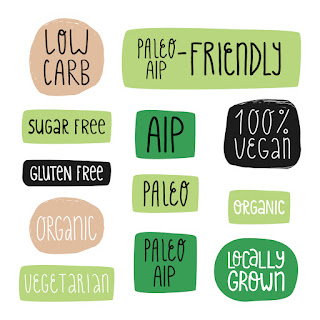 |
| djmilic | Deposit Photos |
Sunday, April 7, 2024
Big Tobacco -- sorry, Big Food -- fights back.
Sunday, January 15, 2023
More on low carbing and such.
 |
| Bubble Beanie | Deposit Photos |
After last week's post, I had a few questions about whether low carb is the same thing as gluten free. Short answer: It's not. Here's why.
Gluten is the thing that holds bread together. It's a protein found in wheat and certain other grains (there's a list at the link). Folks with celiac disease, which is an autoimmune disease, can't eat anything with gluten in it, because their bodies fight back by attacking the lining of the small intestine. Eventually it affects their body's ability to absorb nutrients from the food they eat. The symptoms range from bloating, constipation and diarrhea to migraines to anemia to anxiety. Not everybody gets all of the symptoms, and some folks get none of them. There's a test your doctor can give you to find out whether you have the disease.
Then there are the folks who don't have celiac disease, but they're sensitive to gluten. They feel better when they avoid foods containing it.
Lots of foods are high in carbs but have zero gluten -- for example, potatoes, tortilla chips, candy*, and regular sodas. Some types of flour are okay for the gluten-free crowd but have too many carbs for a low-carb diet -- for example, cornmeal and rice flour. By the same token, some flours are low carb but bad for the gluten-free crowd; I mentioned last week that vital wheat gluten is one of these.
It gets crazier, particularly for folks with diabetes, because diabetics are virtually always told to eat whole grains like brown rice and whole wheat bread -- even though brown rice has a glycemic index (how quickly a food will raise your blood sugar, from 0 to 100) of 55 and whole wheat flour's glycemic index is 69.
Cornmeal's glycemic index is 70. Coconut flour, which shows up in a lot of low-carb foods, has a glycemic index of 50.
Now, 50 is supposedly pretty low. But compare it with almond flour's glycemic index of zero. And nuts, of course, have no gluten. So almond flour is a good choice for both folks avoiding carbs and folks avoiding gluten.
***
A word about the graphic up top: I'd never heard of a paleo AIP diet before, so I looked it up.
I'd heard of paleo, which is all about eating like our Neanderthal forebears did. You're allowed meat, seafood, eggs, fruits, veggies, and nuts and seeds. Verboten foods include beans and legumes, dairy, refined sugars, grains, any flour, anything fermented, and coffee. I couldn't tell you why some of these foods are off limits -- seems like even a Neanderthal could gather wild grains for porridge or something -- but anyway, that's how the eating plan works.
AIP was a new one on me. It's short for "autoimmune protocol," and it's basically an elimination diet to help reduce inflammation, which is suspected to cause some autoimmune disorders. First you do a version of paleo for a few weeks; then you gradually add back in certain foods and keep track of whether they make your symptoms worse.
***
Speaking of nuts and diabetes: This past week, the American Academy of Pediatrics made me all kinds of crazy when they issued new guidelines for treating obesity in children. The AAP is now recommending that pediatricians prescribe weight loss drugs for kids as young as 12 and bariatric surgery for kids 13 and up. For the younger set -- maybe as young as six, or even two! -- doctors should embark on an intensive program of lifestyle therapy, including behavioral and nutritional advice, for both the child and the parents.
Do you suppose it's a coincidence that this new, intensive approach has followed so closely on the heels of the Food and Drug Administration's approval of Wegovy (a.k.a. Ozempic, an injectible drug for diabetes) as a weight loss drug for kids as young as 12? Yeah, neither do I.
The AAP says the old approach of waiting to see whether the kid will outgrow the fat isn't working anymore. Too many fat kids are turning into fat teens, the AAP says, with the attendant risks of heart disease and diabetes and yada yada. Okay, but much of the weight loss advice I've received from doctors and dieticians over the years has been simplistic, outdated, and just plain wrong. Do we really want to hand our kids over to Big Pharma and Big Diet? Because it'll be lobbyists from those industries that shape the assistance our kids get, and I don't trust those lobbyists to be helpful to anyone but their investors.
Remember when Big Tobacco promised to 'fess up about how unhealthy and addictive smoking is, and then finessed their way around that promise? If you don't think this thing with kids and obesity is going to go down the same road, you're living in a fantasy world.
***
*You'd be surprised what manufacturers sneak flour into. Even some candies have flour in them -- caramel creams immediately come to mind. Gotta check the ingredients on everything.
***
These moments of floury blogginess have been brought to you, as a public service, by Lynne Cantwell. Stay safe!
